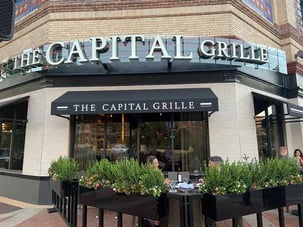5 min read
Does Your MEP Firm Need To Be In The Same City As You?
Dialectic Engineering
Jan 15, 2019 7:44:15 AM

We don’t think so. Are we biased? Maybe, but, we recently sat down with our CFO, Greg Trees to hear how Dialectic has successfully provided MEP services to clients nationwide over the past 30+ years and will let you decide.
Q: What has resonated most with you over the years as a CFO?
A: If it works, don’t fix it. I have been a CFO for many years and have had the privilege to work in several industries all over the globe. I’ve learned that every company is different, even if it looks the same on paper. A company is made up of methods, customers, products, philosophies, geography, length of existence and above all people. The people of a company create a diversity that extends beyond the framework of a company and enrich its culture.
As CFO, I have been associated with many acquisitions. I can’t tell you how many times I fought to protect the company by keeping executive management from changing a winning formula. I joined Dialectic at a time when they were transitioning from Larson Binkley, a well-known and highly respected name in the industry, to Dialectic. Unlike previous experiences, here was a company who was reinventing itself to better reflect how it operated internally. All that to say, if you have found the recipe for success, don’t change it.
Q: In your current role as CFO have you been able to identify the ingredient for success?
A: Communication. In speaking to our clients across the country I hear the same two problems: “My MEP misses too many deadlines”, and “My MEP is a poor communicator”. I believe, identifying that these two issues are not independent of one another was crucial. There is something broken, for a lack of a better term, in our industry. The elephant in the room, engineers are not known for their ability to communicate.
Perhaps the better way of putting it is that engineers and architects simply communicate differently. Architects are generally right-brain oriented extroverted creative types, where engineers tend to be left-brain dominant, introverted calculated types. This dynamic is often overlooked, which puts a strain on the team’s ability to properly communicate.
It has been our experience that architects will attempt to remedy this lack of communication by insisting they work with a local MEP firm. The thought is “If I can have my MEP firm in front of me, they will certainly communicate better”. Unfortunately, that still does not address the dichotomy of how architects and engineers communicate.
Q: What makes Dialectic different from other engineering firms?
A: If you were to walk into our space you would immediately sense the difference. We are in a brick building built in the early 1900’s in an industrial part of downtown Kansas City, now known for its art and food culture. You feel a vibrant energy buzzing within the space. There is not a single cubicle in sight, and each desk serves as a white erase board to sketch out ideas or problem solve. As you look around the space you’ll see people huddled together in groups as they discuss specifics of the job they are working on. Without knowing what kind of firm you just stepped into, you would probably guess that we are a creative design firm.
Our people, principles and processes are what truly set us apart from other engineering firms. The processes and the value at which we hold communication driven customer service is what has made us so successful, it is in our name. If you were to look up Dialectic in the dictionary you would find that it means “the art of investigating or discussing the truth of opinions”.
Q: How has Dialectic improved communication?
A: Through a lot of trial and error, and an extreme amount of pain to change the status quo. As a mid-sized MEP firm in Kansas City who provides its service on a national and international scale to a large roster of clients, our success has hinged on our ability to communicate. Over the years, Dialectic has developed tools and implemented processes derived from our use of different project management philosophies. From Edwards Deming philosophy of continual improvement to the Agile Design Methodology used by big Tech firms and everything in between. We have taken pieces of each and combined them to fit our industry and the way we operate. There is no secret ingredient, unless you count hard work and the ability to recognize when something is not working and having the wherewithal to try something different.
These tools and processes allow us to work on projects anywhere in the country with clients hundreds of miles away and still provide high quality MEP design faster and more efficiently than our competitors.
Q: What tools does Dialectic use to complement these processes?
A: In an age of texts, emails and conference calls, it should be easier to communicate. We have found that if you rely solely on those avenues it can cripple your ability to communicate. Imagine for a minute you have an inbox of 100+ emails in a day that you have to curate, respond to and file. Not to mention the calls you receive throughout the day or conference calls you are scheduled to attend.
Dialectic has developed software internally that automates a great deal of the day-to-day tasks that our designers and project managers are required to do. The more we can automate the time-consuming processes the more we free up our employees to talk to our clients and one another.
As a firm that has been in business for 30+ years, there is very little we have not seen. We might be based out of Kansas City, but we work in all 50 states, from coast to coast. Not every jurisdiction is a breeze to get through. We have compiled a database that highlights code changes or adoptions, challenges faced in that specific jurisdiction or even with a specific inspector. This database is a value-add for our clients during the permitting process.
Being in Kansas City is a tool in and of itself. We can be on any site from coast to coast, including Canada, within a day. Even local engineers would need time to make themselves available. When all is said and done there is really no time savings associated to using a local engineer. We have staff specifically dedicated to that service and as such can mobilize on a moment’s notice to be on-site within 24 hours if need be.
I cannot go without mentioning our white papers, which are tools for our clients as much as they are to our staff. We publish one new white paper every quarter. The topics vary from quarter to quarter, but they are quick references to our clients for information that can educate a decision or provide clarification on challenges faced during design.
For example, the California Title 24, the gold standard for energy code. California is the state with the largest concentration of our projects. Our familiarity with local codes and Title 24 sets us apart, even when compared to MEP firms in CA. That is in great part due to the effort associated to preparing our white paper. We publish a white paper highlighting the changes that are being implemented once a new edition is released as a quick reference to our staff as well as a resource to our clients to highlight what changes will impact their design and construction budgets.
Q: What would you want the reader to take away from this interview?
A: Dialectic’s offering is simple. Communicate early, often and promptly, be available for conversation. Work to eliminate red lines and get our designer the info they need. Without knowing it, you have most likely set foot in a space that we did the MEP design for. We did that design from Kansas City and we did it better and faster than your typical local MEP firm.
Greg Trees
Chief Financial Officer, Dialectic

